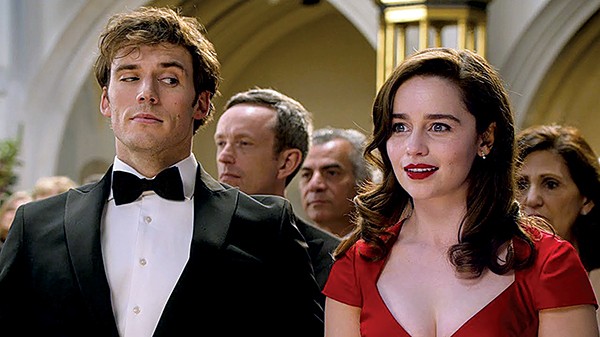Femmes fatales in film are regarded as misogynist for their kneejerk evil but feminist for lacking the doormat and sounding board qualities which define the majority of cinematic female characters. We don’t know whether the title character in the period suspense drama My Cousin Rachel is one, or just a woman subject to the whims of an obsessive suitor. Philip (Sam Claflin), our main character, treats her alternately as angel of light and an exotic figure of suspicion. First we hear about her in letters which imply she poisoned his cousin/adoptive father in Italy, after marrying him. When she arrives, she is gentle and charming, although with a penchant for serving people vats of specially made tea. An offscreen doctor says her husband died of a brain tumor which made him paranoid.

Rachel Weis and Sam Clafin in My Cousin Rachel.
Philip, who heretofore spent his scenes detailing the harm he will cause Rachel (Rachel Weisz), is immediately smitten. An orphan entering his mid-twenties, he notes he has “never seen a woman cry,” and his need for love overrides his caution. Weisz must play Rachel both as a widow getting over her loved one’s death by hanging out with someone who looks like him, and also as a figure of mysterious Italian letters, unexplained horse rides and inquiries about the will. The film’s only problem is Philip’s inexperience and gullibility which, while provoking suspense, are a little repetitive. The family attorney (Simon Russell Beale) and his godfather (Iain Glen, a.k.a. Jorah Mormont, in best unheeded counselor mode) warn him again and again, yet he seeks to woo Rachel with the wealth he will soon inherit. It’s hard to root for someone who only makes bad decisions to further the plot, which weights our sympathies with the possible murderer.
Notably for a period film, Philip’s servants are visible. Outnumbering him, they live lives unconcerned with his affairs, eating, cussing and getting paid all while knowing to steer clear of his drama. (They also find time to ominously sing the British folksong “The Three Ravens”, about birds discussing a knight’s corpse abandoned in a field. I would have preferred The Twa Corbies.)
Director Roger Michell (Changing Lanes, Notting Hill) and cinematographer Mike Eley start with what looks like most British period dramas, but as Philip loses focus, so do they, using objects blocking the frame, rack focuses and a handheld camera to mirror Philip’s mental state. The editing speeds up as things get more intense, and overall the film holds you in suspense. Based on a novel by Daphne du Maurier, it nevertheless is a bit old-fashioned. Du Maurier provided the basis for two Hitchcock films, but not for the one this film most resembles, Suspicion. Because the character of Rachel remains too elusive, the psychology is old hat. We never leave Philip’s viewpoint, and Rachel’s ambiguity is never big enough to let Weisz make a complete portrayal. She suggests a grieving woman constrained by her time and relationships, via half-sentences and shyness. The film is best as a haiku-like sketch of a widow in need of different social norms.
My Cousin Rachel
For a more vibrant period drama suspense thriller, I would recommend Chan-Wook Park’s The Handmaiden, which replaces that director’s appetite for violence with sex. Here Weisz’s “limitless appetite” is alluded to a few times as warning to Philip, but during the only sex in the film she stares at the sky and thinks of England. For a more adventurous movie with Weisz, I’d recommend Yorgos Lanthimos’ The Lobster, which segues from a meditation on socialized monogamy into a critique of how everything is socialized. My Cousin Rachel is enjoyable but not ambitious. Its sex is restrained, its deaths hidden. The tactfulness that just happens to beits style is also that of the endless wave of British period dramas that have washed on our shores every year since before I was born.
